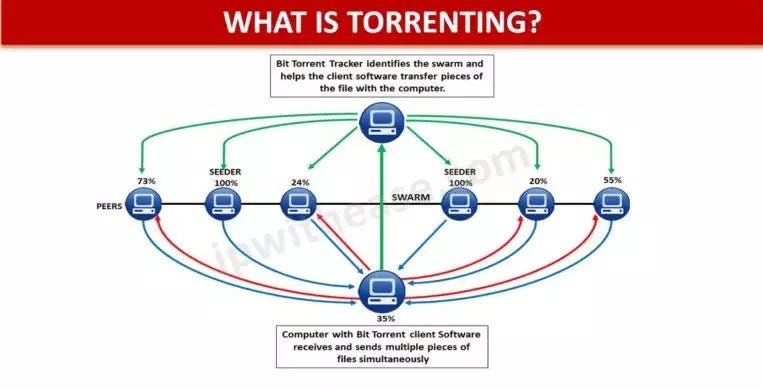What is a torrented file? Understanding torrents explained
Definition of a Torrent
A torrent is a file format used for sharing and distributing data over the internet. It typically contains metadata about files and folders to be shared, including their names, sizes, and structure. This metadata allows users to understand what files are included in the torrent and how they are organized.
How Torrents Work
Torrents utilize a peer-to-peer (P2P) file-sharing protocol, allowing users to download and upload files simultaneously. When a user downloads a torrent, they are not downloading the file from a single source but rather from multiple users who have parts of the file. This method increases the efficiency and speed of the download process.
The BitTorrent Protocol
The protocol used for torrents is called BitTorrent, which was developed by Bram Cohen in 2001. This protocol enables the distribution of large files by breaking them into smaller pieces, allowing users to download these pieces from various sources, which enhances download speed and reliability.
Efficiency of Downloading with Torrents
By breaking files into smaller pieces, torrents enable users to download large files more efficiently. Each piece of a file can be downloaded from multiple sources, which means that the overall download speed can be significantly increased compared to traditional downloading methods.
Understanding Peers and Swarm Members
Users who download a torrent are often referred to as "peers" or "swarm members." Each peer contributes to the sharing of the file, and the collective group of peers sharing a particular file is known as a swarm. This collaborative approach is what makes torrenting effective.
Role of Torrent Clients
A torrent client is software that allows users to open and manage torrent files. Popular torrent clients include uTorrent, BitTorrent, and qBittorrent. These applications facilitate the downloading and uploading of files, manage connections to other peers, and organize the downloaded content.
Types of Files Shared via Torrents
Torrents can be used to share various types of files, including:
- Movies
- Music
- Software
- Games
- Documents
Copyright Issues and Legal Considerations
The use of torrents can sometimes be associated with copyright infringement, as many users share copyrighted material without permission. It is essential for users to be aware of the legal implications of downloading and sharing such content.
What are Legal Torrents?
Legal torrents exist, often provided by creators or distributors who want to share their content freely. These torrents may include open-source software, public domain films, or educational materials that are legally available for distribution.
Torrent File Extensions and Magnet Links
Torrent files usually have a .torrent file extension, while the actual data being shared is often stored in a separate location. Magnet links are an alternative to .torrent files, allowing users to download content directly without needing a separate file. Magnet links simplify the process by linking directly to the content rather than requiring a .torrent file.
Decentralization of the BitTorrent Protocol
The BitTorrent protocol is decentralized, meaning there is no central server hosting the files. Instead, users share files directly with each other, which enhances the resilience and efficiency of the file-sharing process.
Seeders vs. Leechers
Seeders are users who have completed downloading the file and continue to share it with others, while leechers are users who are still downloading. The balance between seeders and leechers can significantly impact the availability and speed of downloads.
Impact of Seeder-Leecher Ratio on Download Speeds
The ratio of seeders to leechers can affect download speeds; more seeders generally lead to faster downloads. A higher number of seeders means that there are more sources for the pieces of the file, which can result in quicker and more reliable downloads.
Legitimate Uses of Torrents
Torrents can be used for legitimate purposes, such as distributing open-source software or large datasets. Many organizations and developers utilize torrents to efficiently distribute their products to a wide audience.
ISP Throttling and Blocking of Torrent Traffic
Some internet service providers (ISPs) may throttle or block torrent traffic, leading to slower download speeds or access issues. This can be frustrating for users who rely on torrents for legitimate purposes.
Using VPNs for Privacy in Torrenting
Users often employ VPNs (Virtual Private Networks) to maintain privacy and anonymity while torrenting. A VPN encrypts internet traffic and masks the user's IP address, making it more difficult for ISPs and other entities to monitor torrenting activities.
Security Risks Associated with Torrenting
Torrenting can pose security risks, including exposure to malware or unwanted content if users download from untrusted sources. It is crucial to use reputable torrent clients and to be cautious about the files being downloaded.
Legal Landscape of Torrenting by Country
The legality of torrenting varies by country and the content being shared. Users should be aware of local laws regarding copyright and file sharing to avoid potential legal issues.
If you liked it and want to know more content similar to What is a torrented file? Understanding torrents explained. Visit our category Internet











By posting you agree to the Privacy Policy
Basic information on data protection